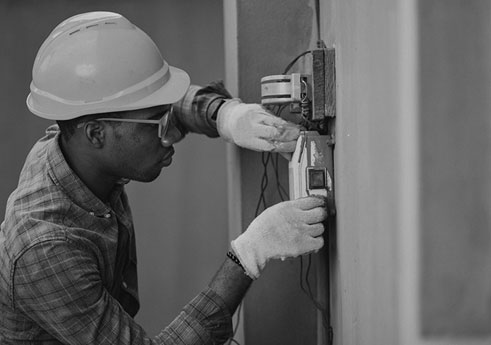In the dynamic world of the UK’s electrician industry, understanding trends and statistics is crucial, whether you’re a practitioner, a business owner, or just curious. Are you wondering about electricians’ earnings, the most in-demand specialties, or how regional variations impact the profession? This article is your go-to resource for answers. It’s not just about figures; it’s about realizing the benefits and opportunities within this sector
Are electricians rich in the UK? How much do electricians can make or earn in the uk?
In 2023, the salary of electricians in the UK varies depending on experience, qualifications, and location. On average, electricians can expect to earn between £44,850 and £48,750 per annum, with some variations based on specific job roles and locations. In some areas, salaries can be significantly higher. For instance, electricians in Welwyn Garden City have reported salaries as high as £250,144, while those in Southampton have seen salaries up to £101,760. However, these figures should be considered as exceptional rather than the norm. Generally, the range for electrician salaries across the UK is quite broad, reflecting the diverse nature of the profession and the varying demands across different regions. Source: https://www.reed.co.uk/
Where do electricians make the most money UK?
Average Salary Across the UK:
- Average Salary: £44,850 – £48,750
- Salary Range: £44,850 – £48,750
Location-Specific Salaries:
- Welwyn Garden City
- Average Salary: £250,144
- Salary Range: £32,289 – £468,000
- Southampton
- Average Salary: £101,760
- Salary Range: £36,000 – £660,000
- South West London
- Average Salary: £74,147
- Salary Range: £34,000 – £235,000
- County Durham
- Average Salary: £73,375
- Salary Range: £29,750 – £117,000
- Worthing
- Average Salary: £62,400
- Salary Range: £62,400 – £62,400
- Petersfield, Hampshire
- Average Salary: £61,000
- Salary Range: £61,000 – £61,000
- Whitby, North Yorkshire
- Average Salary: £55,936
- Salary Range: £55,936 – £55,936
- Edgware
- Average Salary: £54,600
- Salary Range: £54,600 – £54,600
- Pontypool
- Average Salary: £54,600
- Salary Range: £54,600 – £54,600
- Crewe
- Average Salary: £54,522
- Salary Range: £54,522 – £54,522
Here is a table displaying the average and range of salaries for electricians in various locations across the UK in 2023:
| Location | Average Salary (£) | Salary Range (£) |
|---|---|---|
| Average (UK) | 44,850 – 48,750 | 44,850 – 48,750 |
| Welwyn Garden City | 250,144 | 32,289 – 468,000 |
| Southampton | 101,760 | 36,000 – 660,000 |
| South West London | 74,147 | 34,000 – 235,000 |
| County Durham | 73,375 | 29,750 – 117,000 |
| Worthing | 62,400 | 62,400 – 62,400 |
| Petersfield, Hampshire | 61,000 | 61,000 – 61,000 |
| Whitby, North Yorkshire | 55,936 | 55,936 – 55,936 |
| Edgware | 54,600 | 54,600 – 54,600 |
| Pontypool | 54,600 | 54,600 – 54,600 |
| Crewe | 54,522 | 54,522 – 54,522 |
This table shows that while the average salary for electricians in the UK generally falls within the £44,850 to £48,750 range, there are significant regional variations, with some areas offering substantially higher average salaries.
How much do electricians earn or make a hour/day/week/month/year in the UK
The salary data for electricians in the UK in 2023, broken down by hour, day, week, month, and year, along with the average and range, is as follows:
- Hourly Rate:
- Range: £9.10 to £19.96
- Average: £14.36
- Daily Rate (for self-employed or contractors):
- Range: £180 to £350
- Average: Based on the hourly rates, this would roughly equate to an average of about £115 to £230, assuming an 8-hour workday.
- Weekly Rate:
- Range: Calculating based on the hourly rate for a standard 40-hour workweek, this would be approximately £364 to £798.
- Average: Based on the average hourly rate, this would be around £574.40 per week.
- Monthly Rate:
- Range: Extrapolating from the weekly rate, the monthly earning potential would be approximately £1,576 to £3,458.
- Average: Based on the average weekly rate, this would be around £2,297.60 per month (considering 4 weeks in a month).
- Yearly Salary:
- Range: £25,000 to £40,000 for typical electricians; over £50,000 for more experienced ones.
- Average: £33,636.
It’s important to note that these figures can vary depending on several factors, such as location, experience, and whether the electrician is self-employed or employed by a company. Moreover, for self-employed electricians, the actual earnings might be different as they can charge varying rates based on the job type and region.
The source of this information includes authoritative sites like PayScale and trade-specific websites, which have provided detailed insights into the earnings of electricians in the UK.
Source: payscale, learntradeskills, tradeskills4u
Here is a table summarizing the salary data for electricians in the UK in 2023:
This table provides an overview of the varying salary ranges and averages for electricians in the UK, based on different time frames. The daily rate is specifically noted for self-employed or contract electricians. The weekly, monthly, and yearly rates are extrapolated from the hourly rates and the reported average yearly salary. The sources include PayScale, Learn Trade Skills, and TradeSkills4U, which are reputable for salary data in this field.
Different types of electrician
What type of electrician is most in demand in the UK?
As of 2023, electricians are highly in demand in the UK, with a significant number of new recruits needed in the coming years. According to the UK Trade Skills Index 2023, commissioned by Checkatrade and researched by Capital Economics, the construction and trades sector, including electricians, is experiencing a substantial skills gap. This report indicates that approximately 104,000 electricians will be needed by 2032 to meet the growing demand. This demand is driven by several factors, including an aging workforce, a decrease in EU workers post-Brexit, and an increase in sector output. The construction sector has seen a notable rise in skills shortages, going from 29% at the start of 2021 to 55% at the end of that year, leading to a high number of vacancies. Source: professional-electrician
Furthermore, a study conducted by Compare Companies, which analyzed online search data, found that while plumbers are the most sought-after tradespeople in the UK, electricians are also in high demand. In 2023, there were 60,500 searches for electricians, making them the third most searched-for trade service. This demand reflects the ongoing need for skilled electricians for home emergencies and necessary fixes that can’t be delayed. Source: electricaltimes
Additionally, the demand for electricians is particularly high in London, influenced by factors such as new building constructions, the need to upgrade old electrical infrastructure, and the growing popularity of electric vehicles. The average salary for an electrician in London is reported to be around £40,000 per year. Source: accesstraininguk
The UK Trade Skills Index 2023 also notes the broader context of the demand for electricians. It highlights the need for significant investment in training and apprenticeships, as well as in social and economic infrastructure, to address the skills gap. The aging population, with a third of the workforce expected to retire in the next decade, coupled with the reduction of overseas workers due to Brexit, are major factors contributing to this demand. The report emphasizes the urgency for the government and industries to collaborate in creating new apprenticeship programs and investing in the future of trade skills. Source: electriciancourses4u
What field of electrician makes the most money?
Based on the information from various sources, here is a list of some of the highest paying fields for electricians in 2023:
- Substation Electrician: Average salary of $63,552 per year.
- Utility Construction Electrician: Average salary of $57,657 per year, with the highest paid earning $89,000.
- Industrial Electrician: Average hourly salary of $29.09.
- HVAC Installer: Average salary of $71,575 per year, with the top earners making up to $112,448.
- Automation Electrician: Average salary of $63,644 per year, with top professionals earning $112K.
- Telecommunications Electrician: Average salary of $57,657 per year.
- Construction Electrician: Average salary of $64,803, with the highest earners making $114,000 per year.
- Industrial Electrical Mechanic: Average salary of $63,141, with the highest earning $88,000 per year.
- HVAC Service Technician: Average salary of $53,778 per year, with the highest-paid earning $85,607.
- HVAC Refrigeration Service Technician: Hourly average salary information not specified.
These figures provide an overview of the salary ranges in different specialized fields within the electrician profession. Keep in mind that salaries can vary based on location, experience, and other factors. Source: exoticcareers
Here is a table summarizing the different electrician roles and their corresponding salaries in the UK and other fields in 2023:
| Electrician Role | Location | 2023 Average Salary | Additional Details |
|---|---|---|---|
| Substation Electrician | General | $63,552/year | |
| Utility Construction Electrician | General | $57,657/year | Up to $89,000 for highest paid |
| Industrial Electrician | General | $29.09/hour | |
| HVAC Installer | General | $71,575/year | Up to $112,448 for top earners |
| Automation Electrician | General | $63,644/year | Up to $112K for top professionals |
| Telecommunications Electrician | General | $57,657/year | |
| Construction Electrician | General | $64,803/year | Up to $114,000 for highest earners |
| Industrial Electrical Mechanic | General | $63,141/year | Up to $88,000 for highest earning |
| HVAC Service Technician | General | $53,778/year | Up to $85,607 for highest-paid |
| Apprentice Electrician | UK | £21,655 – £47,678/year | Median: £24,371 |
| Top 10% Master Electricians | UK | Up to £70,000/year | Average: £36,088 |
| Commercial Electrician | UK | £38,296/year | Range: £31,207 – £42,500 |
| Union Electrician | UK | £25,000 – £40,000/year | Over £50,000 for experienced with qualifications |
| Auto Electrician | UK | £27,824/year (PayScale) | Ranges: £18,000 – £44,000 |
| £29,479/year (Talent.com) | |||
| £37,403.96/year (Check-a-Salary) | Range: £30,000 – £51,000 | ||
| Industrial Electrician | UK | £17.41/hour | Annual: £29,000 – £48,000 |
| Self-Employed Electrician | UK | Varies by region | Average: £51,200/year |
| Fully Qualified Electrician | UK | £25,000 – £40,000/year | Up to £50,000 for specific roles |
| Average Electrician | UK | £32,100 – £35,000/year | Range up to £45,000 |
How much do apprentice electricians earn or make in the UK?
In the UK, apprentice electricians in 2023 earn a salary that typically ranges between £21,655 and £47,678. The median salary for this role is approximately £24,371 per year. This data provides a general overview of the expected income for apprentice electricians in the UK, with variations depending on factors such as location, company, and level of experience. Source: talent
What do the top 10% of electricians make in UK?
In the UK in 2024, the top 10% of master electricians earn up to £70,000 per year. This figure represents the higher end of the salary range for master electricians, with the average salary for this role being around £36,088 per year. It’s important to note that these figures can vary based on factors such as location, experience, and specific employer. Source: payscale
How much do commercial electricians make in UK?
In the UK, the salary for commercial electricians varies. As of 2023, the average salary for commercial electricians is around £38,296 per year. This figure represents an average across various regions and companies. The salary range for commercial electricians can start from entry-level positions at approximately £31,207 per year and go up to £42,500 per year for the most experienced workers. These figures are general estimates and actual salaries can vary based on factors like location, experience, and specific employer demands. source: talent
How much do union electricians make in UK?
The average salary for electricians in the UK can vary significantly based on factors like experience, location, specialization, and the sector in which they work. As of 2023, the general salary range for electricians is between £25,000 to £40,000 per year. Electricians with more experience and additional qualifications can potentially earn over £50,000 annually. These figures are not specific to union electricians but give a general idea of the earning potential in the electrical field in the UK.
It’s important to note that union electricians might have different pay scales, benefits, and working conditions compared to non-union electricians, which can affect their overall compensation. Union membership can influence salaries through collective bargaining agreements, which often result in better pay, benefits, and working conditions.
For more detailed and specific information regarding union electrician salaries in the UK, it would be advisable to consult directly with a relevant trade union or check out specific job listings that mention union positions.
How much do auto electricians earn in UK
In the UK, the salary for auto electricians varies, with several sources providing different ranges and average figures for 2024.
According to PayScale, the average salary for an Automotive Electrician is approximately £27,824 per year. The salary range typically falls between £18,000 and £44,000, depending on factors like experience, location, and specific employer. Source: payscale
Talent.com reports a slightly different average, placing it around £29,479 annually. They indicate that entry-level positions start at £25,500 per year, while experienced workers can earn up to £38,018 per year. Source: talent
Another source, Check-a-Salary, provides a higher average annual salary of £37,403.96 for Auto Electricians in the UK. They note a range from £30,000 to £51,000, suggesting a wider spread based on experience and skills. Source: checkasalary
These differences can be attributed to various factors such as data collection methods, the specific subset of professionals surveyed, and regional salary variations. Overall, auto electricians in the UK can expect to earn a salary within these ranges, with potential for higher earnings based on experience and specialization.
How much do industrial electricians earn in the UK?
The salary of industrial electricians in the UK varies depending on experience, location, and other factors. As of 2024, the average hourly pay for an industrial electrician is approximately £17.41. The lower end of the salary range is around £14.79 per hour, while the higher end reaches about £23.49 per hour. This translates to a total pay range of approximately £29,000 to £48,000 annually, depending on hours worked and additional bonuses. Source: payscale
In terms of annual salaries, industrial electricians can expect to earn between £23,760 and £44,520. This range represents the full spectrum of pay both before and after tax. The variation in salary can be attributed to different levels of experience, qualifications, and the specific demands of the role within various industries. Source: uktaxcalculators
Moreover, specific job listings and company offers also show a wide range of salaries for industrial electricians. For instance, some positions offer salaries between £40,000 and £43,000 per annum, while others may range from £36,500 to £52,000, depending on the company and location within the UK. Source: talent, talent, reed
It’s important to note that these figures are averages and can vary based on various factors such as location, experience, and specific industry requirements. For more detailed information about salaries in different regions or for specific companies, it would be beneficial to consult job listings and salary surveys in the relevant sectors.
How much do self employed electricians earn in the UK
Self-employed electricians in the UK can expect to earn varying salaries depending on several factors, including their location, experience, and the type of work they do. As of the most recent data available:
- Regional Variations: Salaries for self-employed electricians differ across regions in the UK. For example, in London, the average salary is around £37,689 per year, while it’s £33,808 in the South East, and £30,311 in the South West. Other regions such as East Midlands, West Midlands, Yorkshire and the Humber, North East, North West, and Scotland have average salaries ranging from approximately £30,000 to £33,000 per year. Souce: accesstraininguk
- Average Salary: On average, self-employed electricians earn significantly more than their employed counterparts. A study involving 20,000 self-employed electricians found that the average annual income for a self-employed electrician is about £51,200, which is 56% more than the average employed electrician’s salary. Source: accesstraininguk
- Factors Affecting Salaries: The income of self-employed electricians can be influenced by their experience, qualifications, and specialization. Those with more experience and higher qualifications, or those specializing in areas like renewable energy or commercial work, tend to earn more. Source: accesstraininguk
These figures provide a general overview of the earnings potential for self-employed electricians in the UK, though actual incomes can vary widely based on individual circumstances and market conditions.
How much does a fully qualified electrician earn in the UK
The salary of a fully qualified electrician in the UK can vary significantly based on factors such as experience, location, and specialization. As of 2023, the average salary typically ranges from about £25,000 to £40,000 per year. However, there are instances where electricians can earn considerably more, especially those with extensive experience and additional qualifications. For instance, some positions offer salaries as high as £45,000 to £50,000 per annum, depending on the role and location.
Electricians in certain regions, particularly in metropolitan areas, may receive higher wages due to the cost of living and demand for specialized skills. It’s also noted that electricians with expertise in specific areas like renewable energy or advanced electrical systems may have the potential to earn higher salaries. Additionally, self-employed electricians or those running their own businesses might have different earning potentials, often influenced by the nature of their clients and the scale of projects they undertake.
For a more comprehensive understanding of the salary range and factors influencing electrician wages in the UK, you may refer to resources like Reed.co.uk, Learn Trade Skills, and Talent.com, which provide detailed insights into the electrician job market and salary expectations.
How much does an average electrician make in the UK?
In the UK, the average salary for electricians in 2024 varies based on different sources. According to Jobted UK, the average salary for an electrician is around £32,100 per year. This figure can go as high as £45,000 for more experienced electricians. On the other hand, uk.talent.com suggests that the average electrician salary is approximately £35,000 per year. The range for electrician salaries can vary significantly, with some jobs offering as much as £41,600 or more, while others may offer around £32,000 to £37,000.
Who earns more bricklayer, electrician, plumber in the UK?
Here is the comparison table for the average salaries of bricklayers, electricians, and plumbers in the UK as of 2024:
| Profession | Average Hourly Rate (£) | Annual Salary Range (£) | Notes | Sources |
|---|---|---|---|---|
| Bricklayer | 13.91 | £17,000 – £49,000 | Varies by experience and location. Higher end for experienced, company-employed workers. | payscale, talent |
| Electrician | 14.36 | £20,000 – £42,000 | Higher earnings in London/South-East. Self-employed can earn over £35,000. | payscale, electriciantraining, leverageedu |
| Plumber | 11.16 | £14,000 – £41,000 | Salaries for specific roles can range from £29,250 to £39,000. | payscale, reed |
As of 2024, the salaries for bricklayers, electricians, and plumbers in the UK vary, with each profession having its own range and average salaries.
- Bricklayer: The average hourly pay for a bricklayer in the UK is approximately £13.91. However, the range varies from £8 to £23 per hour, depending on experience and location. This translates to total annual earnings that can range from £17,000 to £49,000. Source: payscale, talent
- Electrician: For electricians, the average hourly rate is around £14.36. Salaries can range from £9 to £20 per hour. The overall annual income for electricians can vary between £20,000 and £42,000. Additionally, experienced and competent self-employed electricians can earn upwards of £35,000 on average, with this figure being higher in areas like London or the South-East. Source: payscale, electriciantraining, leverageedu.
- Plumber: I will now search for the salary information for plumbers in the UK to provide a complete comparison.
Based on the data from 2024, the average earnings for bricklayers, electricians, and plumbers in the UK show some variation:
- Bricklayer: The average hourly rate for bricklayers is about £13.91. Their earnings can range significantly, from about £17,000 to £49,000 annually, depending on factors such as experience, location, and the type of employment (self-employed or company-employed). Source: payscale, talent
- Electrician: Electricians have an average hourly pay of approximately £14.36. The annual salary for electricians can vary between £20,000 and £42,000. It’s worth noting that experienced, self-employed electricians can earn upwards of £35,000 on average, with potential for higher earnings in areas like London or the South-East. Source: payscale, electriciantraining, leverageedu
- Plumber: Plumbers have a slightly lower average hourly rate of around £11.16. The total annual income for plumbers can range from £14,000 to £41,000. Specific job postings also indicate annual salaries for plumbers ranging from about £29,250 to £39,000, depending on the role and location. Source: payscale, reed
From this data, it appears that electricians generally have a slightly higher earning potential compared to bricklayers and plumbers in the UK as of 2024. However, these figures can vary widely based on location, experience, and whether the individual is self-employed or working for a company.
How much do electricians charge in the UK?
The cost of hiring an electrician in the UK in 2024 varies depending on the location and the nature of the job. Generally, the hourly rate for an electrician in London is around £50 – £60, but this can rise to as much as £100 per hour in certain situations, such as emergency call outs during weekends or evenings, small jobs, or when a minimum call-out charge applies. In other areas of the UK, the average cost can range between £20 and £49 per hour. For instance, in Birmingham, the cost is around £20 per hour, while in cities like Manchester, Glasgow, and Edinburgh, it’s approximately £32 – £33 per hour. London, unsurprisingly, is the most expensive, with an hourly rate of £49. Source: checkatrade, nimblefins
The cost can also be influenced by various factors, including the type of job, the condition and age of the electrical system, the complexity of the work, and the accessibility of the area needing work. Additionally, electricians might charge differently based on whether the job is charged by the hour or as a fixed rate for a specific task.
For specific tasks, the costs can vary. For example, the cost for installing a new socket is around £130, while installing a CCTV system can cost about £500. If you’re looking to install an electric vehicle charger, it could cost approximately £300. These prices can differ based on the complexity and requirements of each individual job. Source: hamuch
It’s always advisable to get multiple quotes for your specific electrical needs to find the most accurate and fair price for the work required.
| Service | Average Cost Range (£) | Additional Details |
|---|---|---|
| Hourly Rate (London) | 50 – 100 | Higher for emergencies, small jobs, or minimum call-out charges. |
| Hourly Rate (Other Areas) | 20 – 49 | Varies by city; e.g., Birmingham: ~20, Manchester/Glasgow/Edinburgh: ~32-33. |
| New Socket Installation | ~130 | |
| CCTV System Installation | ~500 | |
| Electric Vehicle Charger Installation | ~300 | |
| Light Fixture Installation (Standard) | 80 – 100 | For simple jobs like a pendant or chandelier. |
| Light Fixture Installation (Complex) | 500 – 1000 | For complex setups like a 6 lamp lighting grid or 4 dimmed wall lights. |
| Labor Cost (Day Rate) | 150 – 200/day | |
| Outdoor Light Installation | 165 (single light) – 400 (extensive) | For a single low-voltage light or 10 LED light clusters with cable. |
| Socket Installation | 100 – 200 | For single, double, or USB sockets; outdoor sockets slightly cheaper. |
| Light Switch Replacement | 75 – 200 | Standard replacement ~75; installing/moving a switch ~150-200. |
Note: These costs are indicative and can vary based on job specifics, electrician rates, and location within the UK. It’s recommended to get multiple quotes for accurate pricing. Sources include Checkatrade, Nimblefins, HaMuch, PriceYourJob, Buildiro, MyJobQuote.co.uk, Home Improvement Quote, and Homehow.
How much do electricians charge to install light fixture in the UK?
The cost of installing light fixtures in the UK can vary significantly based on several factors, including the type of fixtures, the complexity of the installation, and regional differences in labor rates. Here’s a general overview of what you can expect:
- Standard Light Fixture Installation: For simpler jobs like installing a single lightweight pendant or chandelier, the cost can range between £80 and £100, usually taking about 2-3 hours. If you’re looking at a ceiling or wall lamp replacement without extra wiring, the cost might be around £60 to £100.
- More Complex Installations: For more elaborate installations, such as a 6 lamp lighting grid in the kitchen with new wiring, costs could range from £800 to £1000. If you’re considering 4 dimmed wall lights in the living room, the estimated cost is around £500.
- Labor Costs: The typical charge for an electrician is around £150 to £200 per day. The duration varies based on the number of light fixtures to be installed and the complexity of the job.
- Outdoor Lighting: The average cost to install a single low-voltage exterior light is about £165. For more extensive installations like 10 LED light clusters with 65 meters of cable, you might expect to pay around £400.
- Spotlight Installation: For installing downlights or spotlights, the cost usually falls between £300 and £500. This includes the downlights themselves, which can cost between £20 to £75 each. Factors like room size, the number of spotlights, and the type of downlights (e.g., LED or halogen) can influence the final cost.
- Regional Variations: Prices can vary depending on your location in the UK. For example, the cost to install or fix a light fitting in areas like Aberdeen is around £72, while in Basildon it might be around £94.
Keep in mind that these prices are general estimates and can change based on specific project requirements, the current market rates, and the electrician you hire. It’s always advisable to get multiple quotes to ensure you get a competitive price for your specific needs.
Source: priceyourjob, buildiro, hamuch, checkatrade
How much does an electrician charge to change a light fixture UK?
The cost of hiring an electrician in the UK to change a light fixture can vary depending on the complexity of the job and the type of fixture being installed. Here’s a breakdown of the costs based on recent data:
- For Simple Light Fixture Replacements: The cost for replacing a ceiling or wall lamp with no additional wiring required is typically between £50 and £100. This job usually takes about 1 to 2 hours to complete.
- For More Complex Installations: For tasks like installing a 6-lamp lighting grid in the kitchen with new wiring, the costs can range from £800 to £1,000 and may take 3 to 4 hours. Similarly, installing 4 dimmed wall lights in the living room may cost around £500 and take 2 to 3 hours.
- Average Labor Charges: Most electricians charge a daily rate ranging from £150 to £200. They might also have a standard call-out fee which is usually about half a day’s work.
- Additional Considerations: The total cost can also be influenced by the type of light fittings (e.g., pendants, downlights, chandeliers), the area’s accessibility, and whether any additional wiring is required.
These estimates provide a general idea of the costs involved but can vary based on location, the specific electrician’s rates, and the precise nature of the job. It’s advisable to get a custom quote for your specific requirements.
For more detailed information, you can refer to resources like MyJobQuote.co.uk, Home Improvement Quote, and Price Your Job.
How much for electrician to install ceiling light in the UK?
The cost of having an electrician install a ceiling light in the UK in 2024 can vary depending on several factors including the complexity of the installation, the type of light fitting, and the location of the job. Based on the information gathered, here’s a summary of the costs:
- Types of Light Fittings and Costs:
- Simple jobs like replacing a ceiling or wall lamp with no extra wiring may cost around £50 for both labour and materials.
- More complex installations, like a 6-lamp lighting grid in the kitchen with new wiring, might cost about £650 for materials and £250 for labour.
- The installation of 4 dimmed wall lights in the living room could be around £250 for materials and £175 for labour.
- Hourly Rates:
- Electricians’ hourly rates can vary, especially in different regions. In London, the rate is typically between £50 and £60 per hour, but it can go up to £100 per hour for emergency callouts or small jobs.
- The average electrician cost per day is approximately £400, which is based on an 8-hour day at £50 per hour.
- Factors Influencing Costs:
- The cost can be influenced by the type of job, the age and condition of existing electrical systems, the complexity of the work, and the location of the property.
- Regional Variations:
- Electrician rates can differ across the UK. For example, the average hourly rate for an electrician near Aberdeen is around £31, while in London, it could be as high as £60.
Please note that these prices are indicative and can vary based on specific job requirements and local variations. It’s always a good idea to get multiple quotes from local electricians for the most accurate pricing.
Sources: MyJobQuote.co.uk, Checkatrade.com, and HaMuch.com.
How much for electrician to install outside light in the UK?
The cost of having an electrician install an outdoor light in the UK varies based on several factors, including the type of light, the complexity of the installation, and the electrician’s location. Here’s a breakdown of the costs you can expect:
- Average Cost of Installation: The average cost to install a single low voltage wall light is around £165. This price generally covers the labor to install the light and safely connect it to the mains power supply. If you’re considering LED lights arranged throughout the garden, the average cost for installing 10 LED light clusters with 65 meters of cable is approximately £400. For soffit lighting installation, which involves fitting lights to the underside of decking, roofs, or porches, the average cost is also around £400. Source: checkatrade
- Hourly and Daily Rates of Electricians: Typically, electricians in the UK charge between £45 and £60 per hour for installing exterior lights. However, the rates can vary depending on the electrician’s experience and location in the country. The average daily rate for an electrician’s labor is approximately £150-£200. Most electricians charge a minimum of half a day’s work, so you can expect labor costs to be around £75-£100 for installing outdoor lights. Source: checkatrade, myjobquote
- Cost Factors: Several factors can influence the overall cost of installing outdoor lights. These include the type of light fixtures you choose (with prices ranging from as low as £2 each for simple landscape lights to over £1000 for luxurious options), the number of lights, the positioning of the lights, ease of access for installation, and your location in the UK (with higher costs expected in London). Source: myjobquote
- Additional Considerations: If you need new wiring for a PIR (Passive Infrared Sensor) motion sensor light, the cost can range from £70 to £200. For replacing an existing light, the cost varies from £30 to £110, and for a new PIR motion sensor light, it’s between £60 and £165. Source: 1stelectricians
In summary, while the average cost of installing a single low voltage outdoor light is around £165, the final cost can vary significantly based on the type of lighting, the number of lights, and the specific requirements of the installation. For a more accurate estimate, it’s advisable to obtain quotes from local electricians.
How much do electricians charge per socket UK?
As of 2024, the cost for electricians in the UK to add or modify plug sockets can vary. The price range for adding a plug socket to a room, whether it’s a single, double, or USB socket, typically falls between £100 to £200, with an average cost of around £150. The cost for installing an outdoor socket is slightly lower, averaging around £110, with a range of £85 to £135.
In terms of electrician charges, the hourly rate for smaller electrical jobs usually ranges from £30 to £60. For larger jobs that require more time, electricians may charge a daily rate, which can vary from £170 to £340.
It’s important to note that these costs can be influenced by several factors, including the type of socket, the location of the installation, the style and quality of the socket, and the ease of access for the electrician. Additional factors that can affect the cost include whether new wiring is needed or if an existing socket is being moved or replaced.
These costs are ballpark averages and can vary based on your specific circumstances and location, especially in areas like London and the South East where rates might be higher. For the most accurate pricing, it’s always recommended to get quotes from local electricians.
For more detailed information, you can refer to the sources I used for this summary, Checkatrade and Homehow.
How much does it cost to replace a light switch UK?
The cost of replacing a light switch in the UK varies depending on factors such as the type of switch, the complexity of the installation, and the rates of the electrician. Here’s a breakdown of the costs:
- Standard Light Switch Replacement: The typical cost for replacing a light switch like-for-like is around £75. This price includes materials and assumes that the job takes about an hour. However, most electricians charge for a minimum of half a day’s work. Source: checkatrade
- Multiple Light Switches: If you’re looking to replace multiple light switches, the cost becomes more economical. For instance, replacing five light switches like-for-like might cost around £100. Source: checkatrade
- Installing or Moving a Light Switch: The cost for installing a new light switch or moving an existing one is typically around £150 – £200. This higher cost is due to the additional work involved, such as wiring, creating a new junction box, and potentially some plasterwork. Source: checkatrade
- Labour Costs: Labour costs can vary, but they generally fall between £50 and £150 for the installation, replacement, or moving of a light switch. The exact cost can be higher for more complex installations like proximity switches. Source: homehow
- Removing a Light Switch or Socket: If you simply want to remove a light switch or socket, the cost would likely be around £25 to £50, not including waste removal. Source: homehow
- DIY Considerations: While replacing a light switch can be a DIY task, it’s important to have basic knowledge about electrical safety, the right tools, and the process of isolating the circuit. If you’re not comfortable with this, it’s safer and more reliable to hire a professional electrician. Source: homeserve
In summary, the average cost to replace a light switch in the UK ranges from £75 for a straightforward replacement to £150 – £200 for more involved installations like moving or adding a new switch. Always consider getting multiple quotes from qualified electricians to ensure you get the best price for your specific needs.
How much do electricians charge per day/hour in the UK
Here is a table summarizing the various costs associated with hiring electricians in the UK in 2024:
| Type of Charge | Average Cost | Additional Information | Source |
|---|---|---|---|
| Hourly Rate | £30 to £60 | Rates can be higher in areas like London; up to £100/hr for emergency/small jobs | checkatrade, ukcosts |
| Minimum Call-out Charge | Varies | First hour may be more expensive | checkatrade, ukcosts |
| Day Rate | £200 to £250 | Depends on location and job complexity | ukcosts |
| Socket Installation | £55 to £75 | – | pricethisplease |
| Fuse Box Replacement | £450 to £800 | – | pricethisplease |
| Shower Installation (Excl. Unit) | £325 | – | pricethisplease |
| Emergency Call-Out | 2 to 4 times standard rate | – | mylocaltoolbox |
Please note that these rates are approximate and can vary depending on the specific requirements of the job and the qualifications of the electrician. It’s recommended to get multiple quotes and consider the electrician’s certifications for safe and compliant work.
The cost of hiring an electrician in the UK varies based on several factors such as location, experience, and the nature of the job. In 2024, the average hourly rates for electricians in the UK range from £30 to £60. However, in areas like London, rates can be higher, especially for emergency call-outs or small jobs, which could go up to £100 per hour. Additionally, electricians might charge a minimum call-out charge, where the first hour may be more expensive. Source: checkatrade, ukcosts.
For day rates, electricians often switch to this mode of billing for jobs taking longer than a day. The average day rate is around £200-£250, although this can vary based on location and the complexity of the job. Source: ukcosts
When considering electricians for specific tasks, it’s important to note that prices can vary. For instance, common services like socket installation can range from £55 to £75, while more extensive jobs like replacing a fuse box may cost between £450 and £800. Shower installation, excluding the cost of the shower unit, averages around £325. Remember, these rates are approximate and can vary depending on the electrician and the specific requirements of the job. Source: pricethisplease
It’s also important to consider that emergency services typically cost more. An emergency call-out can be anywhere from two to four times the electrician’s standard hourly rate. Source: mylocaltoolbox
When planning electrical work, it’s recommended to obtain multiple quotes to compare rates and services. Also, consider the qualifications and certifications of the electrician to ensure safe and compliant work.
Can a UK electrician work in Ireland/Canada/Australia/USA?
Ireland
A UK electrician seeking to work in Ireland needs to have their professional qualifications recognized under the European Recognition of Professional Qualifications Directive (2005/36/EC). This involves a process where the electrician’s qualifications from outside the Republic of Ireland must be recognized before they can apply for registration with the Safe Electric Scheme, which is a requirement for electrical contractors working in Ireland. The recognition process includes submitting an application detailing professional qualifications and experience, which is then reviewed by an expert panel. If the application is approved, the individual can then apply to register with the Safe Electric Scheme. However, direct applicants with specific qualifications, such as the City & Guilds Level 3 Diploma in Installing Electrotechnical Systems and Equipment, might be able to apply directly to join the scheme. Source: cru, gov
Additionally, it’s important to note that since Brexit, mutual recognition of professional qualifications between the EU and the UK no longer applies. Therefore, UK electricians need to get their qualifications recognized in Ireland or any other EU member state where they intend to work. Sourve: citizensinformation
As for working in Canada, Australia, or the USA, the process will be different and subject to the specific regulations and requirements of each country. Generally, electricians would need to have their qualifications assessed and possibly undertake additional training or examinations to meet local standards and regulations. It’s advisable to check with the relevant professional bodies or governmental agencies in the respective countries for detailed information.
Canada
A UK electrician can work in Canada, but there are specific requirements and processes to follow. In Canada, the profession of an electrician is regulated, meaning that a license or certification is typically required to work. The authority for these regulated occupations usually lies with provincial and territorial governments, and they often delegate this authority to regulatory bodies within their jurisdictions. About 20% of occupations in Canada are regulated, including electricians, which means that foreign credentials must be recognized by these regulatory bodies. The foreign credential recognition process involves verifying that the training, education, and/or experience obtained in another country meet the standards set by the Canadian federal, provincial, or territorial authorities. Source: canada
For electricians specifically from the UK looking to immigrate to Canada, it’s required to have NVQ Level III qualifications. The process begins with calculating your Canada Immigration points, which must equal or exceed 67. Points are awarded based on various criteria like age, qualifications, language abilities, partner’s skills, and work experience. After receiving an Invitation to Apply from Canadian Immigration, you have 60 days to lodge a formal application. It is essential to have all your points verified before applying, as you cannot retrospectively verify these after applying. The Skills Assessment process is crucial as it verifies your electrical skills, experience, and qualifications. A positive Skills Assessment allows you to claim the requisite points on the Express Entry CRS and serves as your Red Seal qualification, qualifying you to work as an electrician in Canada from day one. Source: emigratecanada
The job requirements for electricians in Canada usually include completion of secondary school and a four- to five-year apprenticeship program. Trade certification for construction electricians is compulsory in many Canadian provinces and territories and available but voluntary in others. The Red Seal endorsement, which is also available to qualified construction electricians, is achieved through successful completion of the interprovincial Red Seal examination. It’s important to contact the regulatory authority in the specific province or territory you’re interested in working in, as the certification process can vary. jobbank
It’s important to note that each province or territory in Canada may have specific requirements and processes for foreign electricians to work there. Therefore, it is advisable to research and contact the relevant regulatory bodies in the specific area of Canada where you wish to work.
USA
A UK electrician looking to work in the USA will encounter several key considerations and requirements:
- Visa and Work Authorization: First and foremost, the electrician would need the appropriate visa or work authorization to legally work in the USA. This could be a non-immigrant visa for temporary work or an immigrant visa for permanent residency. The specific type of visa required would depend on the nature and duration of the work.
- Certification and Licensing: Electrical work is heavily regulated in the USA, and requirements can vary significantly from state to state. In most cases, a UK electrician would need to obtain a license from the state where they intend to work. This usually requires passing an exam that tests knowledge of the National Electrical Code and local regulations, as well as proof of a certain level of experience and training. The UK electrician’s existing qualifications may not be directly transferable, and additional training or coursework in US electrical standards and codes might be necessary.
- Local Codes and Standards: Electrical standards, codes, and practices can differ between the UK and the USA. Familiarity with the National Electrical Code (NEC), which is widely adopted in the USA, is essential. This code covers all aspects of electrical safety and is regularly updated.
- Insurance and Liability: In the USA, electricians often need to carry liability insurance. This protects both the electrician and their clients in case of accidents or damage related to the electrical work.
- Continuing Education: Some states require continuing education as part of the licensing process for electricians. This is to ensure that all licensed practitioners are up-to-date with the latest standards and technologies.
- Language and Cultural Differences: While language may not be a barrier, understanding local business practices, customer service expectations, and workplace norms can be important for professional success.
For a UK electrician, therefore, working in the USA involves navigating immigration laws, obtaining appropriate licensing, adapting to local codes and standards, and understanding the business environment. It’s advisable to conduct thorough research and possibly seek legal and professional advice before making the move.
How many hours do electricians work UK?
In the UK, electricians and electrical fitters typically work an average of 45 hours per week, as reported in the Annual Survey of Hours and Earnings for the year 2019. This data reflects the average weekly working hours for this profession across the country. For more detailed information, you can visit Careersmart.org.uk.
How many Electricians in the UK?
As of 2023, there were approximately 46,141 electrician businesses operating in the UK, indicating a 14% increase from the previous year. This data, sourced from Statista, reflects the growing number of electrician businesses in the country.
Furthermore, a significant demand for electricians is projected in the UK, with a report revealing that over 100,000 new electrician recruits will be needed by 2032. This is to address an “alarming skills gap” in the construction sector, intensified by factors such as an ageing workforce, the exodus of EU workers post-Brexit, and expanded sector output. The demand for electricians is part of a broader need in the construction and trades sector, with nearly a million new recruits required to keep pace with demand, including a significant number of qualified apprentices. This information comes from the UK Trade Skills Index 2023, commissioned by Checkatrade.
These statistics highlight both the current state and the future prospects of the electrician industry in the UK, emphasizing the need for skilled professionals in this field. Source: professional-electrician
Based on the information provided, here is a table summarizing the key statistics about electricians in the UK:
| Category | Details |
|---|---|
| Total Electrician Businesses | Approximately 46,141 (as of 2023) |
| Growth Rate | 14% increase from the previous year |
| Projected Demand | Over 100,000 new electrician recruits needed by 2032 |
| Female Electricians | Approximately 1% of the electrical workforce (about 2,000 female electricians) |
| Deaths Per Year | Between 2010-2016, a total of 26 electricians died; less than 5 die annually from electrocution (based on 2008-2018 data) |
| Sources | – Statista (for business data) <br> – UK Trade Skills Index 2023, Checkatrade (for demand projection) <br> – Electrical Contractors’ Association (ECA), TradeSparky (for data on female electricians) <br> – Neighborhood Watch, HSE, ONS (for death statistics) |
This table provides a comprehensive overview of the current state and future outlook of the electrician industry in the UK, including the number of businesses, projected demand, gender diversity, and safety statistics.
How many female electricians are there in the UK?
As of recent data, the number of female electricians in the UK represents a small but significant portion of the electrical workforce. According to a report by the Electrical Contractors’ Association (ECA), women make up about 1% of the electrical workforce in the UK. This is a notable increase from previous years; for instance, in 2011, women constituted only 0.6% of electricians in the UK, which grew to 1.2% by 2022. Additionally, another source, TradeSparky, indicates that out of over 250,000 British electricians, approximately 2,000 are female, corroborating the 1% figure.
This gradual increase in the number of female electricians is part of a broader trend of women entering trades that have been traditionally male-dominated. Despite this progress, there are still challenges such as gender stereotypes, a lack of awareness about career paths in electrical work for women, and underrepresentation in senior positions within the industry. Efforts are being made to encourage more women to join the electrical trade and to provide training and resources for those interested.
For detailed insights, you can refer to the original articles on Access Training UK and Voltimum UK.
How many electricians die a year in the UK?
The number of electricians who die each year in the UK varies, and the data is somewhat fragmented. However, I found several sources that provide insight into this matter:
- Between 2010 and 2016, a total of 26 electricians lost their lives in the UK, as reported by Neighborhood Watch. This period highlights the risks associated with the installation of electrical systems, which is considered one of the most dangerous jobs in the country. The deaths during these years underscore the hazards posed by electricity, including the potential for fires and electrocutions.
- The Health and Safety Executive (HSE) reported that, on average, less than 5 people die annually from electrocution in the UK, based on figures from 2008 to 2018. This data includes fatalities from various industries, with the construction industry, including electrical installations, being particularly prone to such accidents. The most at-risk age group for these fatalities is between 36 and 45 years.
- The Office for National Statistics (ONS) in the UK keeps detailed records of deaths, including those caused by exposure to electric current. While they do not have specific data publicly available for electrician deaths in the entire UK, they do hold datasets that can provide such information upon request. This data would include the number of deaths by occupation code in England and Wales.
These sources indicate that the number of electrician deaths per year in the UK is relatively low but not negligible, highlighting the inherent risks of the profession. The variability and specificity of the data suggest that the risks depend on several factors, including the type of electrical work, the industry, and the adherence to safety protocols.
Are electricians in high demand in the UK?
Electricians are indeed in high demand in the UK, and this demand is expected to continue rising. According to the UK Trade Skills Index 2023, there is a significant skills gap in the construction sector, with over 100,000 new electrician recruits needed by 2032. This demand is attributed to various factors, including an ageing workforce, the exodus of EU workers post-Brexit, and increased sector output. The report, conducted by Capital Economics and commissioned by Checkatrade, highlights that the UK needs nearly a million new recruits in the entire construction and trades sector to keep pace with demand, with electricians being the most sought-after among the traditional trades skills.
Furthermore, the demand for electricians is not uniformly distributed across the UK. It is particularly high in London, driven by factors like the construction of new buildings, the need to upgrade old electrical infrastructure, and the growing popularity of electric vehicles. The average salary for an electrician in London is around £40,000 per year, reflecting the high demand.
An analysis conducted by electrical wholesaler ERF also indicates a significant shortage of electricians across many parts of the UK. For example, Middlesex, Surrey, and Hertfordshire are among the areas with the highest number of electrician job vacancies. The study found that half of the UK has a shortfall of more than 50 electricians in various areas, with some locations having over 100 vacancies.
These findings underscore the urgent need for more qualified electricians in the UK and the potential opportunities for individuals considering a career in this field. The increasing demand and the current skills gap present a valuable opportunity for those looking to enter the electrical trade, either as experienced professionals or through apprenticeships and training programs.
Sources: Electrical Times: Article on Shortage of Electricians in the UK
Is there a shortage of electrician skills UK?
As of 2024, the United Kingdom is indeed experiencing a notable shortage of skilled electricians. This situation is impacting various industries, including construction, infrastructure development, and essential services. The shortage is attributed to several factors:
- High Demand and Insufficient Supply: The demand for electricians is outstripping the supply of qualified workers. This gap is reflected in consistently high vacancy rates for electricians across the UK, which are above the national average.
- Aging Workforce: A significant portion of the current workforce in the electrical industry is reaching retirement age, which is contributing to the skills gap. The industry is facing challenges in replacing these experienced electricians with new, less-experienced workers.
- Training and Apprenticeships: Despite efforts to promote careers in electrical work and the availability of apprenticeship programs and vocational training, the number of new entrants into the profession is insufficient to meet the growing demand. The complexity and length of the training process might deter potential candidates.
- Brexit Impact: The UK’s exit from the European Union has had an effect, with many European electricians returning to their home countries, leading to a shortfall in skilled workers.
- Geographical Disparities: There are significant regional variations in the demand for electricians. For instance, areas like Middlesex, Surrey, and Hertfordshire have reported a particularly high number of job openings for electricians.
The shortage of electricians presents both challenges and opportunities. On one hand, it underscores the need for more electricians in the country and highlights the importance of training and recruiting new talent. On the other hand, it offers attractive career opportunities due to competitive salaries and the potential for stable employment in a high-demand field.
This situation calls for continued collaboration between government, industry stakeholders, and educational institutions to find sustainable solutions to this pressing issue, while capitalizing on the opportunities it presents for aspiring electricians.
Sources:
- Optima Electrical Training
- Electrical Review
- Electrical Times
How hard is it to become an electrician in the UK?
Becoming an electrician in the UK involves a combination of education, training, and acquiring relevant qualifications. Here’s a summary of the key steps and considerations:
Educational and Training Requirements
- Apprenticeships: Most electricians start with an apprenticeship. You’ll usually need 5 GCSEs at grades 9 to 4 (A* to C), including English and maths. An apprenticeship combines practical work with study and typically takes 2-4 years to complete.
- Qualifications: Key qualifications include the Level 2 and Level 3 Diplomas in Electrical Installations (C&G 2365). After completing these diplomas, the C&G 2357 NVQ course is the next step, culminating in the AM2 Assessment. Passing this qualifies you as an industry-approved electrician.
- Experienced Worker Assessment: For those with over five years of experience but no formal qualifications, the Experienced Worker Assessment can validate your skills (C&G 2346 Experienced Worker NVQ Level 3).
Becoming Fully Qualified
- ECS Gold Card: Obtaining an Electrotechnical Certification Scheme (ECS) card is essential to prove your qualifications and experience.
- Specialization: Electricians can specialize in areas like renewable energy, machine repair, or electrical design.
- Ongoing Learning: Keeping up with new technologies and regulations is crucial for continuous professional development.
Career Prospects and Earnings
- Starting Salary: As a newly qualified electrician, expect a starting salary of around £18,000 to £23,000, increasing to £25,000 – £35,000 with experience. Highly experienced electricians can earn over £40,000.
- Self-Employment: Many electricians opt for self-employment, offering flexibility and potentially higher earnings.
- Demand: Electricians are in high demand in the UK, and this trend is expected to continue, especially with the push for new home construction and renewable energy.
Challenges and Rewards
- Physical Demands: The job can be physically demanding and sometimes hazardous, requiring adherence to safety protocols.
- Variety of Work: Electricians work in diverse settings, from residential homes to industrial sites, ensuring a varied workday.
- Stability: The profession offers stability and opportunities for growth and specialization.
In summary, becoming an electrician in the UK is a structured process involving formal education and training. The career promises good prospects, with opportunities for both employment and self-employment. It requires a commitment to ongoing learning and adherence to safety standards but offers a rewarding and potentially lucrative career path.
Source: nationalcareers, professions, tradeskills4u, electriciantraining, helloprimo, skillstg, skillstg, accesstraininguk
How much does an electrician course cost UK?
The cost of electrician courses in the UK varies depending on the type of program and the level of certification sought. For a diploma certification, aspiring electricians can expect to pay between £2,399 and £6,500, which generally includes taxes and fees for certification. This price range typically covers Level 2 & 3 Diplomas under City & Guilds, Electrotechnical Craft (2365). Source: 1stelectricians
In specific cases, such as at East Durham College, the Level 2 Diploma in Electrical Installation for the 2024-25 academic year is priced at £1,813.50. This fee is waived for students aged 16-18 under certain conditions. Source: edc
For a more accelerated option, the Fast Track Electrician Courses at Optima Electrical Training, which focus on achieving a Level 3 Diploma, are designed for adults looking for a quick transition into the electrical trade. These courses offer flexible scheduling options, including weekend or evening classes. Source: optima-ect
Another institution, Proactive Technical Training, offers the City and Guilds 2365 Level 2 course, which is a 15-week program providing introductory knowledge of basic electrical concepts, primarily through evening classes. Source: proactivetechnicaltraining
Able Skills provides a City & Guilds Level 2 Electrical Course, which is available full-time over 7 weeks at a cost of £3,195 (including VAT). They also offer a part-time option and a flexible home study option. The course fee can be paid in instalments, with a £500 deposit required to secure a booking. Source: ableskills
It’s important to note that these costs can vary based on the specific course, institution, and any additional materials or resources that may be required. Additionally, the total cost to become a fully qualified electrician may also include additional expenses for tools, equipment, and other business startup costs if one chooses to become self-employed.
How much does it cost to become an electrician inz the UK?
The cost of becoming an electrician in the UK varies depending on the route you take and the level of qualification you aim for. There are generally three main ways to become a certified electrician:
- Domestic Electrical Installer Course: This is a beginner-level course. The cost for this course ranges from £899 to £2,000, which usually includes VAT and certification fees. Some learning centers offer the option to pay in instalments.
- Diploma or Technical Certificate Course: For a more advanced diploma certification, aspiring electricians can expect to pay between £2,399 and £6,500, inclusive of taxes and certification fees. This typically covers Level 2 & 3 Diploma under the City & Guilds, Electrotechnical Craft (2365). Registration fees, which are separate, average around £500.
- Apprenticeship Program: For electrician apprentices in the UK aged between 16 and 18 years, there is no tuition fee, and they are paid a national minimum wage of £4.15 per hour.
Additional Costs:
- Tools and equipment are a significant investment for electricians, ranging from £300 to £650 for hand tools and around £1,000 for power tools.
- If you plan to be self-employed, additional costs include a van (second-hand costs between £650 to £1,000), van insurance (£1,300 to £2,400), and other administrative costs like electrician cards and public liability insurance.
The total cost to become an electrician, including training and setting up for a self-employed business, is approximately £6,500. However, this can vary based on factors such as location, institution, and individual circumstances.
For a detailed breakdown, you can refer to the sources from 1st Electricians here and TNS Electrical Solutions here.
How long does it take to train and become an qualified electrician in the UK?
To become a qualified electrician in the UK, there are several pathways, each with different durations:
- Apprenticeships: These are a common route and typically take about 4 years to complete. Apprenticeships involve both on-the-job training and study, allowing you to earn while you learn. Some apprenticeships, like the Domestic Electrician apprenticeship, might take approximately 3 years. Source: tradeskills4u
- Direct Training Courses: These courses offer a faster track to qualification. For instance, the NVQ Level 3 Electrical Training Course consists of a 6-week center-led training, followed by 1-3 years of portfolio building, and finally, a 2.5-day assessment (AM2/Gold Card). The total duration can range from 1 to 4 years depending on how quickly you complete your portfolio. Source: options-skills.co.uk
- College Courses: You can start with Level 2 and 3 diplomas in electrical installations, which are typically completed over 2 years. After this, you would need to gain employment and work towards completing your NVQ qualification to become fully qualified. Source: electriciancourses4u
- Experienced Worker Route: For those with significant experience in the electrical field but without formal qualifications, there are accelerated pathways. This involves an assessment of your experience followed by targeted training to fill in any gaps in your knowledge and skills. Source: options-skills.co.uk
- Intensive Training Courses: Some training providers offer intensive courses that enable you to gain necessary qualifications in a matter of weeks. These are often suitable for those looking for a quick transition into the field and are comfortable with a fast-paced learning environment. Source: accesstraininguk
In summary, the time to become a qualified electrician in the UK can range from a few weeks (for intensive courses) to 4 years (for apprenticeships or full training courses). The average duration would likely fall between 2 to 4 years, depending on the chosen route and individual circumstances such as prior experience and pace of learning.
How long is an electrician apprenticeship in the UK?
In the UK, the duration of an electrician apprenticeship typically ranges between 3 to 4 years. This timeframe includes both classroom instruction and on-the-job training under the guidance of experienced electricians. However, it’s important to note that some apprentices with prior qualifications and relevant skills may have the opportunity to complete their apprenticeship in a shorter period, potentially within two years, in a ‘fast-track’ scenario.
For a more precise duration, according to the Institute for Apprenticeships and Technical Education, a typical duration to the gateway for an installation electrician or maintenance electrician apprenticeship is about 42 months, excluding the end-point assessment period.
These apprenticeships are comprehensive, covering various aspects of electrical work, and upon completion, apprentices have a recognized qualification and are prepared for a long-term career in the electrical field.
For more detailed information, you can visit the official sources: Apprenticeships.gov.uk and Jewson and Institute for Apprenticeships and Technical Education.
People also ask
What is the hardest part of being an electrician?
The hardest parts of being an electrician can be summarized as follows:
- Completing Projects Within Timeframe and Budget: Electricians often face the challenge of completing large-scale projects within the set timeframe and keeping them within the budget. This is crucial in industrial environments where delays can lead to significant financial losses for the company.
- Staying Updated with Advancements in Electrical Technology: The rapid advancements in electrical technology mean electricians must continually update their skills and knowledge. Failing to keep up with new technologies and compliance laws can lead to missed job opportunities.
- Managing Customer Expectations and Communication: Electricians often deal with high customer expectations regarding quick service delivery and adherence to budgets. Effective communication and understanding customer needs are crucial for maintaining a good reputation and securing repeat business.
- Competitive Job Market: The electrical contracting market is highly competitive, especially for large commercial projects. This competition requires electricians to be highly skilled and knowledgeable to secure the best job opportunities.
- Safety Concerns: Ensuring safety from the start to the end of a project is a significant challenge, especially in industrial settings. Electricians must adhere to strict safety protocols to prevent accidents.
Each of these challenges requires a combination of skill, experience, and often technological support to overcome. Electricians must be adaptable, continually educated, and customer-focused to thrive in this demanding profession.
What do electricians earn in the UK?
In 2024, the average salary for electricians in the United Kingdom is approximately £35,000 per year. This figure is derived from an analysis of around 10,000 salary data points. However, it’s important to note that actual salaries can vary based on factors such as experience, location, and specific job roles within the electrical industry.
Do electricians need a license UK?
In the UK, electricians do need to have specific qualifications to work, although a formal “license” as such is not explicitly mentioned. The qualifications required depend on the type of electrical work being undertaken.
- Basic Qualifications for Electricians: To begin working unsupervised, an electrician should complete an accredited training course up to a Level 3 standard. An NVQ Level 3 Assessment is also recommended as it may be viewed favorably by some employers.
- Qualifications for Domestic and Commercial Electricians: Domestic electricians need to complete a domestic installer course covering Part-P regulations, wiring regulations, testing, electrical inspection, and installation. Commercial electricians must complete an electro-technical qualification with a Level 3 NVQ Diploma in Electro-Technical Systems and Equipment.
- Registration and Industry Standards: While it’s not a legal requirement, many electricians register with the National Inspection Council for Electrical Installation Contracting (NICEIC) to demonstrate their competence and adherence to high standards. For construction site work, obtaining a CSCS Card is considered. Electricians may also join a Competent Person Scheme (CPS), allowing them to self-certify that their work meets the latest building regulations.
- International Electricians Working in the UK: For electricians qualified in JIB-approved license countries (Australia, Canada, New Zealand, South Africa, USA, Republic of Ireland), they may work in the UK construction, commercial, and industrial sectors without additional qualifications. Those from non-JIB-approved countries need to have their qualifications recognized and approved by the JIB.
- Regulatory Compliance: Electricians must comply with key legal requirements such as The Electricity at Work Regulations 1989, The Building Act 1984 & 2000, and the BS7671 – Requirements for Electrical Installations. Part P of The Building Regulations, introduced in 2005, is crucial for domestic premises, requiring certain works to be signed off by a registered electrician.
As we wrap up this insightful exploration of the UK’s electrician industry, we invite you to engage further. Do these statistics align with your experiences or expectations? Share your thoughts in the comments and spread the word on social media. If there are aspects you’re curious about or if you feel something’s missing, don’t hesitate to ask. Your input is invaluable in enriching this conversation and understanding the dynamic world of electricians in the UK. Let’s keep the dialogue going!


 White LED Strip Lights
White LED Strip Lights Green LED Strip Lights
Green LED Strip Lights Ceiling LED Strip Lights
Ceiling LED Strip Lights Cuttable LED Light Strips
Cuttable LED Light Strips Garage LED Lighting Strips
Garage LED Lighting Strips Modern Track Lighting
Modern Track Lighting Ceiling Track Lighting
Ceiling Track Lighting LED Linear Track Lighting
LED Linear Track Lighting Black Track Lighting
Black Track Lighting White Track Lighting
White Track Lighting Linear Ceiling Light
Linear Ceiling Light Modern Linear Lighting
Modern Linear Lighting Black Linear Lighting
Black Linear Lighting White Linear Lighting
White Linear Lighting Recessed Linear Light
Recessed Linear Light Surface Mounted LED Linear Lights
Surface Mounted LED Linear Lights Recessed Spotlights
Recessed Spotlights Black Spotlight
Black Spotlight White Spotlights
White Spotlights LED Panel Light 600×600
LED Panel Light 600×600 Kitchen Downlighting
Kitchen Downlighting Commercial Downlights
Commercial Downlights Black Downlights
Black Downlights White Downlights
White Downlights![Electricians Statistics in the UK[2023 stats]-Article-All you need to know-DALL·~1](https://www.kosoom.uk/wp-content/uploads/2024/01/DALL·1-1.jpg)

![Interior designer Statistics in the UK[2023 stats] -Article-All you need to know-DALL·E 2024 01 27 14.48.37 A large, eye catching photo designed for a report cover or a presentation slide. The theme is 'Interior Designers Stats UK'. The main focus is a very](https://www.kosoom.uk/wp-content/uploads/2024/01/DALL·E-2024-01-27-14.48.37-A-large-eye-catching-photo-designed-for-a-report-cover-or-a-presentation-slide.-The-theme-is-Interior-Designers-Stats-UK.-The-main-focus-is-a-very--1067x800.jpg)






